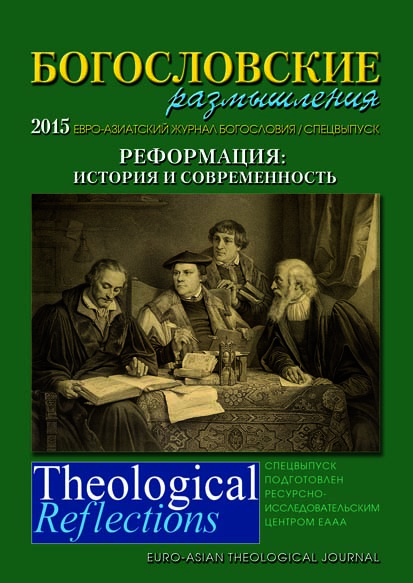The Influence of the Reformation’s Ideas on Transformations in Western Culture
Keywords:
Reformation, Western Culture, Max Weber, Protestant EthicAbstract
Many historians agree that the most important source of these ideas lay in the Reformation, the religious renewal movement. The famous church historian Phillip Shaff has called the Reformation the greatest historical event after the birth of Christianity. This religious movement, directly or indirectly, provided an impetus for other progres sive movements, becoming the major driving force in the history of modern civilization. Other scholars have voiced a similar opinion. For example, Max Weber in his wellknown work The Protestant Ethic and the Spirit of Capital ism, has shown how Protestant religious ideas provoked a social revolution in society; the Reformation historian D. MacCulloch admits that it is impossible to understand presentday Europe without having grasped the changes that took place in the sixteenth century. The term “Reformation” in this article is used in a more limited sense, referring to Lutheran and Calvinist branches. Sometimes these movements are also referred to as the “mainstream Reformation,” i.e. the movements that shaped the theology of “classical” Protestantism. The term “culture” refers to a multifunctional, complex phenomenon that encompasses all areas of human activity, not just artisticesthetic or intellectual kinds of work.
Downloads
How to Cite
Issue
Section
License
Copyright (c) 2020 Tomas Kristijonas Dièius

This work is licensed under a Creative Commons Attribution-NonCommercial 4.0 International License.
All articles published in the Journal are distributed under a Creative Commons Attribution-NonCommercial 4.0 International License
By submitting an article for publication in Theological Reflections: Eastern European Journal of Theology the author grants the editors the right to publish the article and distribute it in electronic and print form.
The author reserves all copyrights and the right to use the materials of the article in whole or in part for educational purposes, to write his own dissertations, to prepare abstracts, conference reports, oral presentations, etc., as well as post electronic copies of articles (including the final electronic version downloaded from the journal’s official website) on non-commercial web-resources without the consent of the editorial board and founders.



